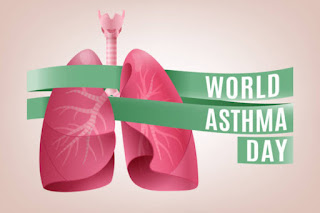Asthma Care For All
Asthma cannot be cured, but its symptoms can be controlled. Asthma is a condition in which your airways narrow and swell and may produce extra mucus. This can make breathing difficult and trigger coughing, a whistling sound (wheezing) when you breathe out and shortness of breath. It is a chronic (ongoing) condition, meaning it does not go away and needs ongoing medical management. According to research published online in the Annals of the American Thoracic Society, asthma costs the US economy more than $80 billion annually in medical expenses, days missed from work and school, and deaths. World Asthma Day is held on the first Tuesday in May. The day is observed in order to improve asthma awareness and care around the world. Asthma affects more than 25 million people in the U.S. currently. This total includes more than 5 million children. According to the latest World Health Organization (WHO) data published in 2020 asthma deaths in Jamaica reached 65 or 0.37% of total deaths. In 2018, asthma accounted for an estimated 14.2 million lost workdays in adults. The annual direct healthcare cost of asthma is approximately $50.1 billion; indirect costs, for example, loss of productivity, add another $5.9 billion, for a total of $56.0 billion. Asthma can be life-threatening if you do not get treatment promptly.
Who can get asthma?
Anyone can develop asthma at any age. People with allergies or people exposed to tobacco smoke are more likely to develop asthma. This includes second hand smoke (exposure to someone else who is smoking) and third hand smoke (exposure to clothing or surfaces in places where someone has smoked). Statistics show that people assigned female at birth tend to have asthma more than people assigned male at birth. Asthma affects Black people more frequently than other races.
What causes asthma?
Certain factors present a higher risk for causing asthma. Allergies: Having allergies can raise your risk of developing asthma. Environmental Factors: People can develop asthma after exposure to things that irritate the airways. These substances include allergens, toxins, fumes and second- or third-hand smoke. These can be especially harmful to infants and young children whose immune systems are not fully developed.
Genetics: If your family has a history of asthma or allergic diseases, you have a higher risk of developing the disease. Respiratory infections: Certain respiratory infections, such as respiratory syncytial virus (RSV), can damage young children’s developing lungs.
You can have an asthma attack if you come in contact with substances that irritate you. For some people, a trigger can bring on an attack right away. For other people, or at other times, an attack may start hours or days later. The following are some common triggers. Air pollution: Many things outside can cause an asthma attack. Air pollution includes factory emissions, car exhaust, wildfire smoke and more. Exercise: For some people, exercising can cause an attack. Tobacco smoke: If you or someone in your home smokes, you have a higher risk of developing asthma. You should never smoke in enclosed places like the car or home, and the best solution is to quit smoking. Strong chemicals or smells. These things can trigger attacks in some people. People with asthma usually have obvious symptoms. These signs and symptoms resemble many respiratory infections: Chest tightness, pain or pressure, coughing especially at nights, shortness of breath and wheezing.
Asthma Treatment Options
There are options to manage one’s asthma. The following are a few more common ones.
Bronchodilators: These medicines relax the muscles around your airways. The relaxed muscles let the airways move air. They also let mucus move more easily through the airways. These medicines relieve your symptoms when they happen and are used for intermittent and chronic asthma.
Anti-inflammatory medicines: These medicines reduce swelling and mucus production in your airways. They make it easier for air to enter and exit your lungs. Your healthcare provider may prescribe them to take every day to control or prevent your symptoms of chronic asthma.
Biologic Therapies for Asthma: These are used for severe asthma when symptoms persist despite proper inhaler therapy.
WHO Response
Asthma is included in the World Health Organization (WHO) Global Action Plan for the Prevention and Control of Non-communicable Diseases (NCDs) and the United Nations 2030 Agenda for Sustainable Development. Asthma is often under-diagnosed and under-treated, particularly in low- and middle-income countries. People with under-treated asthma can suffer sleep disturbance, tiredness during the day, and poor concentration. Asthma sufferers and their families may miss school and work, with financial impact on the family and wider community. If symptoms are severe, people with asthma may need to receive emergency health care and they may be admitted to hospital for treatment and monitoring. In the most severe cases, asthma can lead to death. Asthma care for all is a vital element in managing asthma.
Wayne Campbell is an educator and social commentator with an interest in development policies as they affect culture and or gender issues.
waykam@yahoo.com
@WayneCamo
©




Comments
Post a Comment